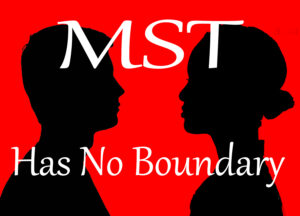MST
MST was the experience. What you suffer because of it is the disability. PTSD is the most common one.
Find what physical or mental injuries you can claim as a disability caused by MST.
- Injuries/Wounds caused by MST
- Contreltophobia is a panic disorder is covered in CFR 4.130 9412
- Trauma Effects are IBS a weaker immune system and more
- Effects and aftermath of rape
Here is the Overview by the VA
 The VA uses the term “military sexual trauma” (MST) to refer to sexual assault or harassment experienced during military service. MST includes any sexual activity that you were involved in that was against your will.
The VA uses the term “military sexual trauma” (MST) to refer to sexual assault or harassment experienced during military service. MST includes any sexual activity that you were involved in that was against your will.
Examples include:
- Being pressured or coerced into sexual activities, such as with threats of negative treatment if you refuse to cooperate or with promises of better treatment in exchange for sex
- Someone having sexual contact with you without your consent, such as when you were asleep or intoxicated
- Being physically forced to have sex
- Being touched in a sexual way that made you uncomfortable
- Repeated comments about your body or sexual activities
- Threatening and unwanted sexual advances
Anyone can experience MST, regardless of gender. Like other types of trauma, MST can negatively affect a person’s mental and physical health, even many years later. Things you may experience could include:
- Disturbing memories or nightmares
- Difficulty feeling safe
- Feelings of depression or numbness
- Problems with alcohol or other drugs
- Feeling isolated from other people
- Problems with anger, irritability, or other strong emotions
- Issues with sleep
- Physical health problems
If you are having current difficulties related to MST, the VA is here to support you in whatever way will help you best — from simply learning more about how MST affects people, to treatment that helps you cope with how MST is impacting your life currently, or if you prefer, a treatment that involves discussing your experiences in more depth.
Watch this video to learn about the effects of MST on survivors and the services the VA has available to assist in recovery.
This website focuses on the health care services that the VA has available for Veterans who experienced MST.
For information about VA disability compensation for conditions related to MST, please view this fact sheet about Disability Compensation for Personal Assault or Military Sexual Trauma.
Help with VA Services and Benefits
For help with treatment and health care related to experiences of MST, please contact your local VA medical center and ask to speak to the MST Coordinator.
Here is what the DOD is doing for MST.
JAG’s Special Victims’ Counsel / Victims’ Legal Counsel. Title 32 PART 105 CFR for Sexual Assault Prevention And Response Program Procedures. Here is the DOD’s UCMJ. Be ready mentally and physically to protect yourself.

